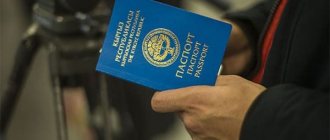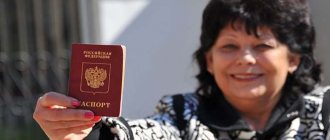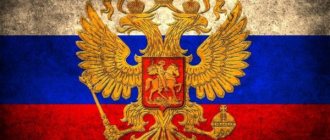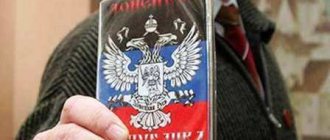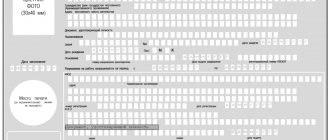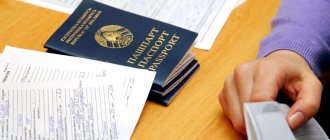The essence of the law
The legal act contains principles related to citizenship of the Russian Federation, regulates relations associated with this status, determines the procedure for obtaining and terminating it. This area is also regulated by the Constitution of the Russian Federation and international treaties.
Obtaining citizenship
The law establishes a general and simplified registration procedure. In the standard procedure, capable foreigners and stateless persons who are over 18 years old can apply for citizenship (Article 13 of Federal Law No. 62).
The period of residence on Russian territory must be at least 5 years, and you cannot travel for more than 90 days per year. This period is reduced for those who have special merits in the field of science, technology, are recognized as refugees and in other situations.
Children's status is issued on the basis of an application from their parents; from the age of 14, the child is already asked if he agrees to become a Russian citizen.
Relaxations have been made for the following categories of applicants:
- has been married to a Russian citizen for at least 3 years;
- had USSR citizenship;
- has one of the parents who is a citizen of the Russian Federation.
A nod was also made to those who, after July 1, 2002, studied according to Russian educational programs and worked for at least 3 years, which is confirmed by contributions to the Pension Fund.
A child is accepted under a simplified procedure if the mother or father are Russian citizens. In this case, there should be no objections from the other party.
Accommodation for foreigners
According to statistics, our country is experiencing a large influx of migrants. Federal Law No. 62 pays attention to their rights and the procedure for obtaining a temporary residence permit (TRP). This document gives the right to legally live in Russia until receiving a residence permit.
The temporary residence permit is issued subject to a quota approved annually. Admission without taking into account this restriction is carried out if there are grounds for it. For example, natives of the RSFSR who had a Soviet passport.
verifying the identity of a foreign citizen on the territory of the Russian Federation and recognized by the Russian Federation in this capacity (if the authorized representative is a foreign citizen). (Part introduced - Federal Law No. 188-FZ dated July 18, 2019)
Article 7. Providing protection and patronage to citizens of the Russian Federation located outside the Russian Federation
1. Citizens of the Russian Federation located outside the Russian Federation are provided with the protection and patronage of the Russian Federation.
2. State authorities of the Russian Federation, diplomatic missions and consular offices of the Russian Federation located outside the Russian Federation, officials of these missions and institutions are obliged to ensure that citizens of the Russian Federation are provided with the opportunity to fully enjoy all the rights established by the Constitution of the Russian Federation , federal constitutional laws, federal laws, generally recognized principles and norms of international law, international treaties of the Russian Federation, laws and regulations of the states of residence or stay of citizens of the Russian Federation, as well as the opportunity to protect their rights and interests protected by law.
Article 8. Citizenship of the Russian Federation and marriage
1. The conclusion or dissolution of a marriage between a citizen of the Russian Federation and a person who does not have citizenship of the Russian Federation does not entail a change in the citizenship of these persons.
2. A change in citizenship by one of the spouses does not entail a change in the citizenship of the other spouse.
3. Divorce of a marriage does not entail a change in the citizenship of children born in this marriage or adopted by the spouses.
Article 9. Citizenship of children
1. The citizenship of a child upon acquisition or termination of citizenship of the Russian Federation by one of his parents or both of his parents is maintained or changed in accordance with this Federal Law.
2. To acquire or terminate citizenship of the Russian Federation by a child aged fourteen to eighteen years, his consent is required.
3. The citizenship of the Russian Federation of a child cannot be terminated if, as a result of termination of citizenship of the Russian Federation, he becomes a stateless person.
4. The citizenship of a child does not change when the citizenship of his parents who are deprived of parental rights changes. In the event of a change in the citizenship of a child, the consent of his parents who have been deprived of parental rights is not required.
Article 10. Documents certifying citizenship of the Russian Federation
A document certifying the citizenship of the Russian Federation is a passport of a citizen of the Russian Federation or another main document containing an indication of the person’s citizenship. The types of basic documents identifying a citizen of the Russian Federation are determined by federal law.
CHAPTER II. ACQUISITION OF CITIZENSHIP OF THE RUSSIAN FEDERATION
Article 11. Grounds for acquiring citizenship of the Russian Federation
Citizenship of the Russian Federation is acquired:
a) by birth;
b) as a result of admission to citizenship of the Russian Federation;
c) as a result of restoration of citizenship of the Russian Federation;
d) on other grounds provided for by this Federal Law or an international treaty of the Russian Federation.
Article 111. Oath of a person acquiring citizenship of the Russian Federation
1. A person acquiring citizenship of the Russian Federation on one of the grounds provided for in paragraphs “b” - “d” of Article 11 of this Federal Law (except for the persons specified in part two of this article) is obliged to take the Oath of a Citizen of the Russian Federation (hereinafter referred to as the Oath ):
“I (last name, first name, patronymic), voluntarily and consciously accepting citizenship of the Russian Federation, swear:
comply with the Constitution and legislation of the Russian Federation, the rights and freedoms of its citizens;
fulfill the duties of a citizen of the Russian Federation for the benefit of the state and society;
defend the freedom and independence of the Russian Federation;
to be loyal to Russia, respect its culture, history and traditions.”
2. The following persons are exempt from taking the Oath:
a) under the age of eighteen;
b) declared incompetent or limited in legal capacity by a court decision that has entered into legal force;
c) those who, due to limited health, are unable to read or pronounce the text of the Oath and (or) sign it with their own hands;
d) other persons in accordance with decisions of the President of the Russian Federation.
3. The oath is taken by a person after the authorized body in charge of matters of citizenship of the Russian Federation has made a decision on the acquisition of citizenship of the Russian Federation by this person.
4. The procedure for taking the Oath is established by the President of the Russian Federation.
(Article introduced - Federal Law dated July 29, 2017 No. 243-FZ)
Article 12. Acquisition of citizenship of the Russian Federation by birth
1. A child acquires citizenship of the Russian Federation by birth if, on the child’s birthday:
a) both of his parents or his only parent have citizenship of the Russian Federation (regardless of the child’s place of birth);
b) one of his parents has citizenship of the Russian Federation, and the other parent is stateless, or is declared missing, or his location is unknown (regardless of the child’s place of birth);
c) one of his parents has citizenship of the Russian Federation, and the other parent is a foreign citizen, provided that the child was born on the territory of the Russian Federation or if otherwise he will become stateless;
d) both of his parents or his only parent living on the territory of the Russian Federation are foreign citizens or stateless persons, provided that the child was born on the territory of the Russian Federation, and the state of which his parents or his only parent are citizens does not provide the child's citizenship. (As amended by Federal Law No. 151-FZ dated November 11, 2003)
2. A child who is on the territory of the Russian Federation and whose parents are unknown becomes a citizen of the Russian Federation if the parents do not show up within six months from the date of his discovery.
Article 13. Acceptance of citizenship of the Russian Federation in the general manner
1. Foreign citizens and stateless persons who have reached the age of eighteen years and have legal capacity have the right to apply for admission to citizenship of the Russian Federation in the general manner, provided that these citizens and persons:
a) reside on the territory of the Russian Federation from the date of receipt of a residence permit until the day of filing an application for admission to citizenship of the Russian Federation for a continuous period of five years, except for the cases provided for in part two of this article. The period of residence on the territory of the Russian Federation is considered continuous if a person travels outside the Russian Federation for no more than three months within one year. The period of residence on the territory of the Russian Federation for persons who arrived in the Russian Federation before July 1, 2002 and do not have a residence permit is calculated from the date of registration at the place of residence; (As amended by Federal Law No. 151-FZ dated November 11, 2003)
b) undertake to comply with the Constitution of the Russian Federation and the legislation of the Russian Federation;
c) have a legal source of livelihood;
d) (Clause has lost force - Federal Law dated April 24, 2020 No. 134-FZ)
e) speak Russian; the procedure for determining the level of knowledge of the Russian language is established by the regulations on the procedure for considering issues of citizenship of the Russian Federation.
2. The period of residence on the territory of the Russian Federation established by paragraph “a” of part one of this article is reduced to one year if at least one of the following grounds is present:
a) the person has high achievements in the field of science, technology and culture; the person has a profession or qualification that is of interest to the Russian Federation; (As amended by Federal Law No. 151-FZ dated November 11, 2003)
b) granting a person political asylum on the territory of the Russian Federation; (As amended by Federal Law No. 151-FZ dated November 11, 2003)
c) recognition of a person as a refugee in the manner established by federal law. (As amended by Federal Law No. 151-FZ dated November 11, 2003)
3. A person who has special services to the Russian Federation may be granted citizenship of the Russian Federation without complying with the conditions provided for in part one of this article.
4. Citizens of states that were part of the USSR, undergoing at least three years of military service under a contract in the Armed Forces of the Russian Federation, other troops or military formations, have the right to apply for admission to the citizenship of the Russian Federation without complying with the conditions provided for in paragraph “a” part one of this article, and without presenting a residence permit. (Part introduced by Federal Law No. 151-FZ dated November 11, 2003; as amended by Federal Law No. 328-FZ dated December 4, 2007)
Article 14. Admission to citizenship of the Russian Federation in a simplified manner
1. Stateless persons who have reached the age of eighteen years and have legal capacity have the right to apply for admission to citizenship of the Russian Federation in a simplified manner without complying with the conditions provided for in paragraphs “a” and “c” of part one of Article 13 of this Federal Law, if the specified persons had USSR citizenship, lived and live in states that were part of the USSR, and did not receive citizenship of these states. (As amended by Federal Law No. 134-FZ dated April 24, 2020)
2. Foreign citizens and stateless persons permanently residing on the territory of the Russian Federation have the right to apply for admission to citizenship of the Russian Federation in a simplified manner without complying with the conditions provided for in paragraphs “a” and “c” of part one of Article 13 of this Federal Law, if the specified citizens and persons: (As amended by Federal Law dated April 24, 2020 No. 134-FZ)
a) were born on the territory of the RSFSR and had citizenship of the former USSR;
b) have been married for at least three years to a citizen of the Russian Federation living on the territory of the Russian Federation; (As amended by Federal Law No. 134-FZ dated April 24, 2020)
c) have a capable son or daughter who has reached the age of eighteen and is a citizen of the Russian Federation; (As amended by Federal Law No. 209-FZ dated July 13, 2020)
d) have a child who is a citizen of the Russian Federation - if the other parent of this child, who is a citizen of the Russian Federation, has died or has been declared missing, incompetent or limited in legal capacity, deprived of parental rights or limited by a court decision that has entered into legal force in parental rights; (Clause introduced - Federal Law dated June 28, 2009 No. 127-FZ)
e) have a son or daughter who has reached the age of eighteen, who are citizens of the Russian Federation and who have been declared incompetent or limited in legal capacity by a court decision that has entered into legal force - in the event that the other parent of these citizens of the Russian Federation, who is a citizen of the Russian Federation, has died or by a court decision that has entered into legal force, is declared missing, incompetent or limited in legal capacity, deprived of parental rights or limited in parental rights; (Clause introduced - Federal Law dated June 28, 2009 No. 127-FZ)
f) after July 1, 2002, received professional education in basic professional educational programs that have state accreditation in educational or scientific organizations of the Russian Federation on its territory and have been working in the Russian Federation for a total of at least one year before the date of application for admission to citizenship of the Russian Federation. Moreover, during the specified period, in relation to such foreign citizens and stateless persons, the employer must accrue insurance contributions to the Pension Fund of the Russian Federation; (Clause introduced - Federal Law dated June 23, 2014 No. 157-FZ; as amended by Federal Laws dated May 1, 2016 No. 124-FZ, dated April 24, 2020 No. 134-FZ)
g) are individual entrepreneurs and carry out business activities in the Russian Federation continuously for at least three years preceding the year of application for admission to citizenship of the Russian Federation, in the types of economic activities established by the Government of the Russian Federation. Moreover, during the specified period, the amount of taxes and fees paid by such citizens and persons in each calendar year in accordance with the legislation on taxes and fees (with the exception of property tax for individuals, land tax, transport tax, state duty and carried out in accordance with the legislation on taxes and fees during the specified period, refunds of amounts of overpaid and (or) excessively collected taxes and fees) and insurance contributions to the Pension Fund of the Russian Federation is at least 1 million rubles; (Clause introduced - Federal Law dated June 23, 2014 No. 157-FZ; as amended by Federal Law dated May 1, 2016 No. 124-FZ)
h) are investors whose share of contribution to the authorized (share) capital of a Russian legal entity operating on the territory of the Russian Federation in the types of economic activities established by the Government of the Russian Federation is at least 10 percent continuously for at least three years preceding the year of filing an application for admission to citizenship of the Russian Federation. In this case, the amount of the authorized (share) capital of such a legal entity must be at least 100 million rubles and during the specified period the amount of taxes and fees paid by such a legal entity in each calendar year in accordance with the legislation on taxes and fees (with the exception of state duties and those carried out in in accordance with the legislation on taxes and fees, during the specified period, refunds of amounts of overpaid and (or) excessively collected taxes and fees) and insurance contributions to the Pension Fund of the Russian Federation amount to at least 6 million rubles; (Clause introduced - Federal Law dated June 23, 2014 No. 157-FZ; as amended by Federal Law dated May 1, 2016 No. 124-FZ)
i) carry out labor activity in the Russian Federation at least one year before the date of application for admission to citizenship of the Russian Federation in a profession (specialty, position) included in the list of professions (specialties, positions) of foreign citizens and stateless persons - qualified specialists, having the right to be granted citizenship of the Russian Federation in a simplified manner, approved by the federal executive body exercising the functions of developing and implementing state policy and legal regulation in the field of employment and unemployment. Moreover, during the specified period, in relation to such foreign citizens and stateless persons, the employer must accrue insurance contributions to the Pension Fund of the Russian Federation; (Clause introduced - Federal Law dated June 23, 2014 No. 157-FZ; as amended by Federal Laws dated May 1, 2016 No. 124-FZ; dated July 3, 2019 No. 165-FZ)
j) have at least one parent who has citizenship of the Russian Federation and lives on the territory of the Russian Federation; (Clause introduced - Federal Law dated April 24, 2020 No. 134-FZ)
k) are citizens of the Republic of Belarus, the Republic of Kazakhstan, the Republic of Moldova or Ukraine. (Clause introduced - Federal Law dated April 24, 2020 No. 134-FZ)
21. Foreign citizens and stateless persons permanently residing on the territory of the Russian Federation, recognized as native speakers of the Russian language in accordance with Article 331 of this Federal Law, have the right to apply for admission to citizenship of the Russian Federation in a simplified manner without complying with the conditions provided for in paragraphs “a” " and "c" part one of Article 13 of this Federal Law.
(Part introduced - Federal Law dated April 20, 2014 No. 71-FZ; as amended by Federal Law dated April 24, 2020 No. 134-FZ)
22. A foreign citizen or stateless person, temporarily or permanently residing on the territory of the Russian Federation, has the right to apply for admission to citizenship of the Russian Federation in a simplified manner without complying with the condition on the period of residence established by paragraph “a” of part one of Article 13 of this Federal Law , and without complying with the condition established by paragraph “c” of part one of Article 13 of this Federal Law, if the specified citizen or specified person is married to a citizen of the Russian Federation living on the territory of the Russian Federation and has common children in this marriage. (Part introduced - Federal Law No. 134-FZ dated April 24, 2020)
3. Disabled foreign citizens and stateless persons who arrived in the Russian Federation from states that were part of the USSR and registered at their place of residence in the Russian Federation as of July 1, 2002, have the right to apply for admission to citizenship of the Russian Federation in a simplified manner procedure without complying with the condition on the period of residence on the territory of the Russian Federation established by paragraph “a” of part one of Article 13 of this Federal Law, and without presenting a residence permit.
4. Foreign citizens and stateless persons who had USSR citizenship, arrived in the Russian Federation from states that were part of the USSR, and were registered at their place of residence in the Russian Federation as of July 1, 2002, or who received a temporary residence permit in the Russian Federation or residence permit, are admitted to citizenship of the Russian Federation in a simplified manner without complying with the conditions provided for in paragraphs “a”, “c” and “e” of part one of Article 13 of this Federal Law, if they declare their desire to acquire citizenship before July 1, 2009 Russian Federation. (As amended by Federal Laws dated January 3, 2006 No. 5-FZ; dated December 1, 2007 No. 296-FZ; dated December 30, 2008 No. 301-FZ)
5. Veterans of the Great Patriotic War who had citizenship of the former USSR are granted citizenship of the Russian Federation in a simplified manner without complying with the conditions provided for in paragraphs “a”, “c” and “d” of part one of Article 13 of this Federal Law, and without presenting a residence permit. and living on the territory of the Russian Federation. (As amended by Federal Law No. 134-FZ dated April 24, 2020)
6. A child and an incapacitated person who is a foreign citizen or stateless person, without complying with the conditions provided for in part one of Article 13 of this Federal Law, has the right to apply with applications for admission to citizenship of the Russian Federation in a simplified manner:
a) one of the child’s parents who has citizenship of the Russian Federation, if there is the consent of the other parent for the child to acquire citizenship of the Russian Federation. Such consent is not required if the child lives on the territory of the Russian Federation;
b) the only parent of the child who has citizenship of the Russian Federation;
c) the child’s guardian, his trustee or the guardian of an incapacitated person who are citizens of the Russian Federation, with the exception of cases provided for in Part 1 of Article 12 and Part 1 of Article 13 of the Federal Law of April 24, 2008 No. 48-FZ “On Guardianship and Trusteeship” (hereinafter — Federal Law “On Guardianship and Trusteeship”);
d) the head of the Russian organization for orphans and children left without parental care, in which the child is placed under supervision, except for the cases provided for in paragraph 2 of Article 1
What opportunities does the law provide?
After receiving citizenship, a person becomes a full member of Russian society. Even in a foreign country, you can count on support if you contact the Russian embassy.
Rights of citizens of the Russian Federation:
- elect power and be elected yourself;
- serve in the Armed Forces;
- hold public service positions;
- receive social benefits;
- place your child in kindergarten or school.
If a Russian citizen leaves the country, he retains his citizenship. Along with rights, new subjects also acquire responsibilities. All citizens must abide by the Constitution, respect the freedoms and rights of others, and pay taxes. It is also necessary to protect the environment and protect the homeland.
Changes in the law
In 2021, a clarification was made to the legal act stating that foreigners are required to confirm their knowledge of the Russian language, laws and Russian history.
Since April 2021, citizens of some districts of the Luhansk and Donetsk regions will be granted citizenship under a simplified scheme.
In 2021, changes were made to Art. 28 Federal Law No. 62. The President received the right to determine categories of citizens who can become Russian citizens according to a simplified scheme. He also establishes for them a list and procedure for submitting documents.
Article 14. Admission to citizenship of the Russian Federation in a simplified manner
Article 14. Admission to citizenship of the Russian Federation in a simplified manner
[Citizenship Law] [Chapter II]
. Foreign citizens and stateless persons who have reached the age of eighteen and have legal capacity have the right to apply for admission to citizenship of the Russian Federation in a simplified manner without complying with the conditions provided for in paragraph “a” of part one of Article 13 of this Federal Law, if these citizens and persons :
- a) have at least one parent who has citizenship of the Russian Federation and lives on the territory of the Russian Federation;
- b) had citizenship of the USSR, lived and are living in states that were part of the USSR, did not receive citizenship of these states and, as a result, remain stateless;
- c) has become invalid. — Federal Law of June 23, 2014 N 157-FZ.
. Foreign citizens and stateless persons living on the territory of the Russian Federation have the right to apply for admission to citizenship of the Russian Federation in a simplified manner without complying with the condition on the period of residence established by paragraph “a” of part one of Article 13 of this Federal Law, if these citizens and faces:
- a) were born on the territory of the RSFSR and had citizenship of the former USSR;
- b) have been married to a citizen of the Russian Federation for at least three years;
- c) are disabled and have a capable son or daughter who has reached the age of eighteen and is a citizen of the Russian Federation;
- d) have a child who is a citizen of the Russian Federation - if the other parent of this child, who is a citizen of the Russian Federation, has died or has been declared missing, incompetent or limited in legal capacity, deprived of parental rights or limited by a court decision that has entered into legal force in parental rights;
- e) have a son or daughter who has reached the age of eighteen, who are citizens of the Russian Federation and who have been declared incompetent or limited in legal capacity by a court decision that has entered into legal force - in the event that the other parent of these citizens of the Russian Federation, who is a citizen of the Russian Federation, has died or by a court decision that has entered into legal force, is declared missing, incompetent or limited in legal capacity, deprived of parental rights or limited in parental rights;
- f) after July 1, 2002, received professional education in basic professional educational programs that have state accreditation in educational or scientific organizations of the Russian Federation on its territory and have been working in the Russian Federation for a total of at least three years before the date of application for admission to citizenship of the Russian Federation. Moreover, during the specified period, in relation to such foreign citizens and stateless persons, the employer must accrue insurance contributions to the Pension Fund of the Russian Federation;
- g) are individual entrepreneurs and carry out business activities in the Russian Federation continuously for at least three years preceding the year of application for admission to citizenship of the Russian Federation, in the types of economic activity established by the Government of the Russian Federation. Moreover, during the specified period, the amount of taxes and fees paid by such citizens and persons in each calendar year in accordance with the legislation on taxes and fees (with the exception of property tax for individuals, land tax, transport tax, state duty and carried out in accordance with the legislation on taxes and fees during the specified period, refunds of amounts of overpaid and (or) excessively collected taxes and fees) and insurance contributions to the Pension Fund of the Russian Federation is at least 1 million rubles;
- h) are investors whose share of contribution to the authorized (share) capital of a Russian legal entity operating on the territory of the Russian Federation in the types of economic activities established by the Government of the Russian Federation is at least 10 percent continuously for at least three years preceding the year of filing an application for admission to citizenship of the Russian Federation. In this case, the amount of the authorized (share) capital of such a legal entity must be at least 100 million rubles and during the specified period the amount of taxes and fees paid by such a legal entity in each calendar year in accordance with the legislation on taxes and fees (with the exception of state duties and those carried out in in accordance with the legislation on taxes and fees, during the specified period, refunds of amounts of overpaid and (or) excessively collected taxes and fees) and insurance contributions to the Pension Fund of the Russian Federation amount to at least 6 million rubles;
- i) carry out labor activity in the Russian Federation at least one year before the date of application for admission to citizenship of the Russian Federation in a profession (specialty, position) included in the list of professions (specialties, positions) of foreign citizens and stateless persons - qualified specialists, having the right to be granted citizenship of the Russian Federation in a simplified manner, approved by the federal executive body exercising the functions of developing and implementing state policy and legal regulation in the field of employment and unemployment. Moreover, during the specified period, in relation to such foreign citizens and stateless persons, the employer must accrue insurance contributions to the Pension Fund of the Russian Federation.
2.1. Foreign citizens and stateless persons permanently residing legally on the territory of the Russian Federation, recognized as native speakers of the Russian language in accordance with Article 33.1 of this Federal Law, have the right to apply for admission to citizenship of the Russian Federation in a simplified manner, provided that these citizens and faces:
- a) undertake to comply with the Constitution of the Russian Federation and the legislation of the Russian Federation;
- b) have a legal source of livelihood;
- c) renounced their existing citizenship of a foreign state. Renunciation of citizenship of a foreign state is not required if this is provided for by an international treaty of the Russian Federation or if renunciation of citizenship of a foreign state is impossible due to reasons beyond the control of the person. A citizen of Ukraine renounces his existing Ukrainian citizenship by sending the citizen an application to renounce his existing Ukrainian citizenship to the authorized body of the given state. A document confirming the refusal of a citizen of Ukraine from his existing citizenship of Ukraine is a notarized copy of the application of this citizen to renounce his existing citizenship of Ukraine.
. Disabled foreign citizens and stateless persons who arrived in the Russian Federation from states that were part of the USSR and registered at their place of residence in the Russian Federation as of July 1, 2002, have the right to apply for admission to citizenship of the Russian Federation in a simplified manner without compliance with the condition on the period of residence on the territory of the Russian Federation established by paragraph “a” of part one of Article 13 of this Federal Law, and without presenting a residence permit.
. Foreign citizens and stateless persons who had USSR citizenship, arrived in the Russian Federation from states that were part of the USSR, and were registered at their place of residence in the Russian Federation as of July 1, 2002, or who received a temporary residence permit in the Russian Federation or a residence permit residence, are admitted to citizenship of the Russian Federation in a simplified manner without complying with the conditions provided for in paragraphs “a”, “c” and “d” of part one of Article 13 of this Federal Law, if they declare their desire to acquire citizenship of the Russian Federation before July 1, 2009 .
. Veterans of the Great Patriotic War who had citizenship are granted citizenship of the Russian Federation in a simplified manner without complying with the conditions provided for in paragraphs “a”, “c”, “d” and “e” of Part One of Article 13 of this Federal Law, and without presenting a residence permit former USSR and living on the territory of the Russian Federation.
. The following children and incapacitated persons who are foreign citizens or stateless persons are granted citizenship of the Russian Federation in a simplified manner without complying with the conditions provided for in part one of Article 13 of this Federal Law:
- a) a child, one of whose parents has citizenship of the Russian Federation - upon the application of this parent and with the consent of the other parent for the child to acquire citizenship of the Russian Federation. Such consent is not required if the child lives on the territory of the Russian Federation;
- b) a child whose only parent has citizenship of the Russian Federation - at the request of this parent;
- c) a child or incompetent person over whom guardianship or trusteeship of a citizen of the Russian Federation has been established, with the exception of cases provided for in Part 1 of Article 13 of the Federal Law of April 24, 2008 N 48-FZ “On Guardianship and Trusteeship” (hereinafter referred to as the Federal Law “On guardianship and trusteeship") - at the request of the guardian or trustee;
- d) a child placed under supervision in a Russian organization for orphans and children left without parental care, with the exception of cases provided for in paragraph 2 of Article 155.1 of the Family Code of the Russian Federation, upon the application of the head of the Russian organization in which the child is placed;
- e) an incapacitated person placed under supervision in a Russian educational organization, medical organization, organization providing social services, or another Russian organization, with the exception of cases provided for in Part 4 of Article 11 of the Federal Law “On Guardianship and Trusteeship” - at the request of the head of the Russian organization in which the incapacitated person is placed.
. In the event that foreign citizens and stateless persons who are participants in the State program to assist the voluntary resettlement of compatriots living abroad to the Russian Federation, and members of their families who have received a temporary residence permit in the Russian Federation or a residence permit, are registered under place of residence on the territory of a subject of the Russian Federation, chosen by them for permanent residence in accordance with the specified State program, or are registered at the place of residence on the territory of the specified subject of the Russian Federation, they have the right to apply for admission to citizenship of the Russian Federation in a simplified manner without complying with the conditions , provided for in paragraphs “a”, “c” and “d” of part one of Article 13 of this Federal Law.
. Foreign citizens and stateless persons have the right to apply for admission to citizenship of the Russian Federation in a simplified manner without complying with the conditions provided for in paragraphs “a”, “c”, “d” and “e” of part one of Article 13 of this Federal Law, if the specified citizens and stateless persons belong to the categories of foreign citizens and stateless persons determined by the President of the Russian Federation in accordance with part one.1 of Article 29 of this Federal Law.
Subtleties of obtaining citizenship
The process of obtaining the desired status takes time. It is necessary to collect the entire extensive package of documents and pay a fee, which amounts to 3.5 thousand rubles. You should also undergo an interview with a special commission, where it is important to confirm your knowledge of the Russian language.
Documents are submitted to the department of the Ministry of Internal Affairs located at the place of residence. If the applicant lives outside the Russian Federation, then you can contact the Russian embassy or consulate.
The Law “On Citizenship” is a real Bible for those who want to become a Russian citizen. It establishes the legal basis for registration and makes it possible for certain categories of applicants to enjoy privileges. The applicant must be prepared to undergo checks and provide additional certificates upon request from the competent authorities.
Lawyer Anna Vladimirovna Krapivnitskaya.
Is it possible to change citizenship
Issues of acquiring, changing or renouncing citizenship of the Russian Federation are regulated by the Law “On Citizenship of the Russian Federation” dated May 31, 2002 No. 62-FZ. A change of citizenship involves the simultaneous acquisition of a passport of one country with the loss of citizenship of another state. This change differs from cases of multiple citizenship, when a person becomes the holder of several passports.
When changing citizenship, all obligations between the person and his former homeland cease. At the same time, new rights and obligations arise between the newly made citizen and another state.
The Law “On Citizenship of the Russian Federation” establishes a voluntary procedure for renouncing Russian citizenship. It is enough for a Russian to express his voluntary will in order to lose his national passport. Moreover, for those Russians who already live abroad, as well as for a child whose father or mother has foreign citizenship, renunciation of citizenship is carried out in a simplified manner.
However, a voluntary refusal procedure does not mean that it occurs automatically. Exit from domestic citizenship will be denied to those Russians who:
- Are charged with a criminal offense or have a criminal conviction pending against them;
- Have unfulfilled obligations to the Russian Federation, for example, in relation to military service;
- They wish to become stateless, that is, they do not have a passport of another state and have no guarantees of receiving it.
You can only renounce Russian citizenship voluntarily—no one can be deprived of it for any reason. This procedure is enshrined in the Constitution of the Russian Federation.
There are several ways to become naturalized in Russia. On a general basis, a migrant can apply for a Russian passport:
- Has reached the age of 18;
- Received a residence permit;
- Having lived in Russia for at least 5 years.
For some categories of persons there is a simplified method of naturalization. Anyone can apply for a passport using a simplified procedure:
- Those who have entered into a marriage with a citizen of the Russian Federation and have lived there for at least 3 years;
- Having children holding Russian passports;
- Former citizens of the USSR who have not received a passport of another state;
- Those born within the RSFSR and who had citizenship of the Soviet Union;
- Those who have invested at least 10 million rubles in the Russian economy;
- Entrepreneurs whose tax payments are at least 1 million rubles. annually;
- Those who have received education and are employed in Russia.
For all these categories of persons, the period of naturalization of the Russian Federation is shortened - the period of residence in Russia is reduced to 3 years.
You may also like
1
Filling out the form to participate in the program...
5 484
Naturalization has also been facilitated for native Russian speakers recognized as such by the certification commission. Russian-speaking citizens must also renounce citizenship of another state. But the period for consideration of the application for them may be reduced to several months.
